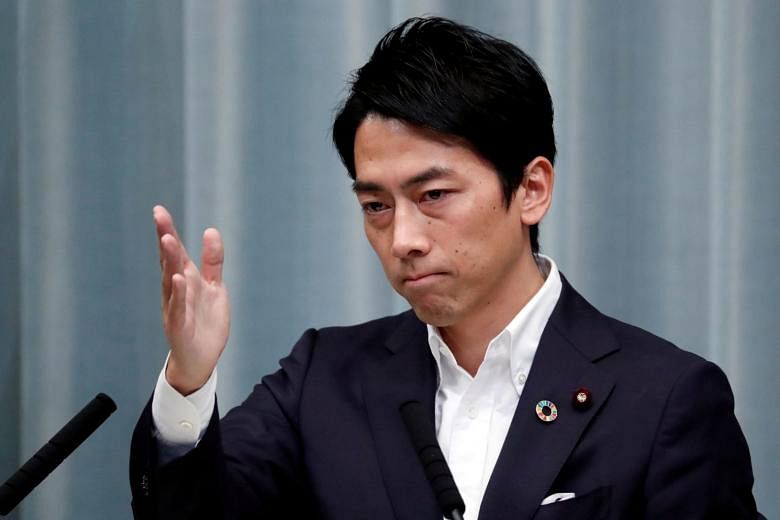TOKYO -Back in 2004, Japan came up with the "3R" environmental initiative to reduce, reuse and recycle under then Prime Minister Junichiro Koizumi.
Now, his son Shinjiro wants the country to reclaim global leadership in the fight against climate change.
But the telegenic 38-year-old, named Environment Minister in September and seen by many Japanese as a potential future prime minister, has his work cut out for him.
Twice, at the recent COP25 climate talks in Madrid, Japan was given the "Fossil Award" for its lack of commitment to give up coal.
The younger Mr Koizumi told foreign media in Japan on Thursday (Dec 19) that progress has been slow partly because of the gulf between how Japan and the world see energy and environment issues.
Since the March 11, 2011 earthquake, tsunami and nuclear disaster, Japan has shifted away from nuclear energy - a low-emission but politically sensitive energy source - towards coal, he noted.
Japan also has an "addiction to plastic" on top of its "addiction to coal", he added.
While it has some ways to go in terms of renewable energy investments, Mr Koizumi said he is eager to look at how his country might be able to wean itself off coal and nuclear power entirely.
"It is the will and intention of the government to promote activities such that renewables will be the core, and main, source of energy," he added.
But the question of how Japan might get there remains.
Mr Koizumi stressed repeatedly during the news conference that closer coordination among the different ministries was paramount.
The Ministry of Economy, Trade and Industry especially plays a key role as it is behind the industrial energy mix - not the Environment Ministry, he said.
Industry minister Hiroshi Kajiyama, however, had said earlier this month: "As options (for an energy mix), we would like to keep coal-fired power plants and power plants using fossil fuels."
Experts have also said there appears to be very little political will in Japan to abandon toxic coal plants owing to vested interests of ruling party lawmakers, who enjoy close ties with coal power plant developers.
Coal accounts for more than 30 per cent of Japan's power supply, and there are plans to build about 20 new coal-fired thermal power plants.
Japan is also exporting such coal power plant technology abroad to developing countries so long as "they are compelled to choose coal as their source of energy".
Still, Mr Koizumi said rather ironically that he was happy to be a dartboard for criticism if it helps raise awareness in Japan of how far the country lags behind the rest of the world in environmental awareness.
He has been criticised domestically for saying that climate change has to be made a "sexy" topic to draw more attention and internationally, for being unable to provide a firm deadline, at the Madrid summit, on weaning Japan off coal.
But the criticisms should not mask the strides Japan has taken, including measures to limit emissions of fluorocarbons that can cause global warming, he added.
Japan is also the world leader in recycling PET (polyethylene terephthalate) plastic bottles. Its supermarkets, convenience stores, drugstores and department stores will begin charging for plastic shopping bags from next year.
This month, Nagano became Japan's first prefecture to declare a climate emergency, following September's devastating typhoon that, among other things, flooded a shinkansen bullet train yard.
It follows the cities of Iki in Nagasaki and Kamakura in Kanagawa in adopting the Climate Emergency Declaration, which is a non-binding promise for municipalities to act to reduce carbon emissions and adopt renewable resources.
Some 28 Japanese municipalities, including Tokyo, Kyoto, Osaka and Yokohama, have pledged to be net zero carbon by 2050 - up from just four in September.
These areas have a total population of 45 million, or nearly the population of Spain, and a total gross domestic product of US$2 trillion.
Mr Koizumi said he foresees major Japanese metropolises being powered by renewable energy industries that are developed in rural areas.
Already, Yokohama has embarked on an initiative to use power developed in the Tohoku region, he noted.
This, if replicated nationwide, can fuel the transformation of Japan's energy map from northernmost Hokkaido to southernmost Okinawa.
"Not everybody can be activists like (Swedish teen) Greta (Thunberg) but in the case of Japan, rather than one person taking 100 steps, if 100 people take just one step forward and make our efforts collectively, we can achieve a zero-carbon future."


